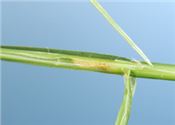|
Summer Rains Help Pastures, Hay Fields

Stem maggots burrow into bermudagrass, which causes the top portion of the stems to die and plant growth to stop.
File photo by MSU Extension Service/Blake Layton
STARKVILLE, MISS.
Mississippi forage producers are taking the good with the bad and dreading the ugly. The state’s pastures have produced ample grass, but they have also suffered from abundant weeds and stem maggots, and fall armyworms may soon cause even more problems.
Rocky Lemus, forage specialist with the Mississippi State University Extension Service, said summer rains have produced good growing conditions for pastures and hay production across the state. Mississippi has about 760,000 acres in hay production.
“Growers are harvesting about 2.9 tons of hay per acre, which is a 10 to 15 percent increase over last year’s average,” he said.
Lemus said pastures are also in good condition and have less insect pressure than in 2014. Although he still receives calls about insect damage, Lemus said is also guiding producers through weed problems and some disease issues.
“Rains not only make the grass grow; they make weeds and fungal diseases grow, too,” he said. “Growers are reporting some leaf spot in fields. That can be avoided or reduced if fertility issues are addressed.”
Lemus, who is also a researcher with the Mississippi Agricultural and Forestry Experiment Station, said fall is the ideal time to test soil.
“Sample soils to check potassium levels. The lower the pH and the lower the potassium levels, the more susceptible plants will be to fungal diseases,” he said.
“Last year, we had so much armyworm pressure early in the season, growers were treating, and that controlled other insects,” Lemus said. “This year, without that armyworm pressure, we’ve had an increase in stem maggots.”
Extension entomologist Blake Layton said stem maggots are not typically as detrimental as fall armyworms. No insect is as brutal as armyworms.
“Growers can have a good field on Thursday, and it can be gone on Saturday morning after armyworms hit,” Layton said. “Just because they have not been as bad this year is no reason to drop your guard. We are starting to get armyworm reports from across the state.”
Layton said growers are still learning how to deal with stem maggots, which typically kill the tip of the stem and stop growth. In some cases, they have robbed growers of a harvest cycle.
“Fall armyworms will destroy a crop in the last stage of growth, but stem maggots do their damage in the early growth stages,” he said. “Treating for stem maggots depends on the level of infestations during previous cutting. If 15 to 20 percent of the stems are infested, then treat seven to 10 days after harvest as the grass starts growing for the next crop.”
Layton said fall armyworms are the No. 1 pest in bermudagrass, but sugarcane aphids are beginning to show up in forage-type sorghums. Insecticides available with emergency exemptions are available to control these aphids, but growers need to be sure to observe timing restrictions before harvest. ∆
|
|